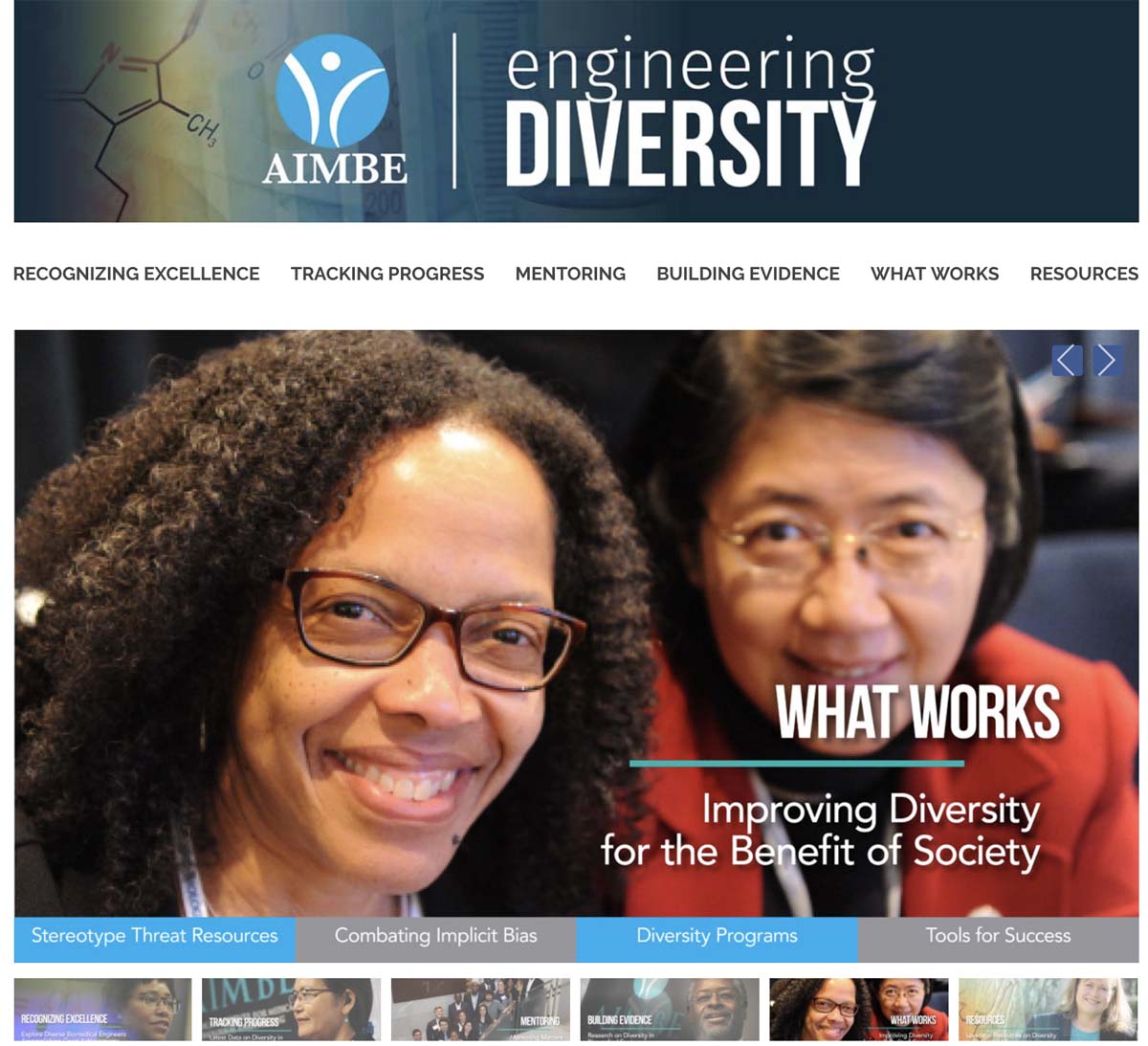
Diversity, Equity, and Inclusion
AIMBE Emerging Leaders Program
The goal of AIMBE’s Emerging Leaders Program is to increase AIMBE’s engagement with exceptional mid-career professionals that are underrepresented in medical and biological engineering (MBE), recognize outstanding rising leaders in MBE, and serve as a pipeline for URM leaders to AIMBE’s College of Fellows. AIMBE is seeking candidates that have made an impact on the field and are within 3-5 years of application eligibility to the AIMBE College of Fellows. This is not an automatic passage into AIMBE Fellowship. However, following this program, AIMBE Emerging Leaders will be successfully prepared to apply for AIMBE Fellowship.
Each year, AIMBE will select ~20 emerging leaders who will be recognized during AIMBE’s Annual Meeting. Emerging leaders will have a unique opportunity to network and engage with AIMBE Fellows at the Annual Event and receive direct mentoring from current AIMBE Fellows. This is a 3-year program and Emerging Leaders would be paired with an AIMBE Fellow mentor. Click here for nomination and eligibility information.
AIMBE Public Policy Institute for Students and Trainees
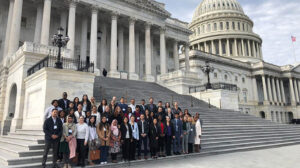 Each year, AIMBE hosts its highly acclaimed Public Policy Institute for Rising Leaders for undergraduate, graduate, and postdoctoral students interested in learning about the policy landscape surrounding medical and biological engineering. Top government officials at FDA and NIH, as well as leading experts on science policy provide a first-hand glimpse into the role of scientists in government and policy.
Each year, AIMBE hosts its highly acclaimed Public Policy Institute for Rising Leaders for undergraduate, graduate, and postdoctoral students interested in learning about the policy landscape surrounding medical and biological engineering. Top government officials at FDA and NIH, as well as leading experts on science policy provide a first-hand glimpse into the role of scientists in government and policy.
AIMBE provides travel awards for underrepresented minorities in biomedical engineering to attend the 2-day workshop in Washington, DC. More information is available here.
Data and Resources
As part of continuing efforts to advance diversity, AIMBE has launched a new website to highlight the contributions of a diverse biomedical community. Women and underrepresented minorities have made tremendous breakthroughs and innovations that are critical to the field, often while overcoming many obstacles. AIMBE celebrates these trailblazers with this newest resource (diversity.aimbe.org) and provides a central touchpoint where individuals can find resources about diversity in the field, learn about the scientific advances of women and underrepresented minorities, and track both the progress and obstacles to success. View and share the website here.
Webinars and Past Events
Equity and Anti-Racism: A Roadmap to Policy Transformation in BME
AIMBE hosted a virtual summit to catalyze institutional changes directed to Biomedical Engineering departments, and their respective institutions, to actively lead the way on anti-racism. The goal of the summit was to provide a set of detailed action items that would foster an optimal climate for equity and inclusion on campus. The following themes were addressed: Culture and Climate, Institutional Policy, Equity and Inclusion, and Public Accountability.
Diversifying Paths to Academic Leadership
AIMBE hosted a symposium on Diversifying Paths to Academic Leadership. The first day of the symposium was open to all faculty to register and attend. The second day of the symposium focused on breakout discussion groups and was open to faculty women to apply to attend through a short application. The purpose of the symposium were to:
- Broaden opportunities for diverse and underrepresented leadership in BioE
- Encourage and invite faculty to consider and prepare to pursue leadership roles
- Educate faculty on expectations and duties of these roles
- Highlight experiences and paths to leadership
Diversity and Equity Committees
Diversity and Inclusion Committee
Mission: The mission of this committee is to achieve greater diversity and inclusion within AIMBE. Increasing diversity includes representational diversity (more members who identify as women or non-cisgendered-male, non-White, non-heterosexual, or differently abled), interactional diversity (effective engagement with diverse perspectives and identities), and structural diversity (organizational embodiment of AIMBE’s commitment to diversity). This committee will also be responsible for identifying best practices and benchmarking compared to other societies and for developing programming for potential future Fellows of AIMBE.
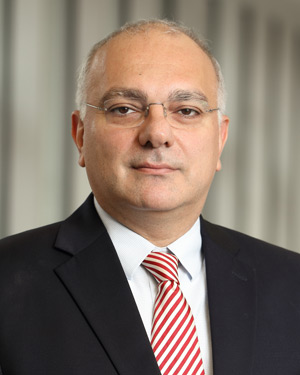
Co-Chair
Mete Civelek, Ph.D.
Associate Professor
Biomedical Engineering
University of Virginia
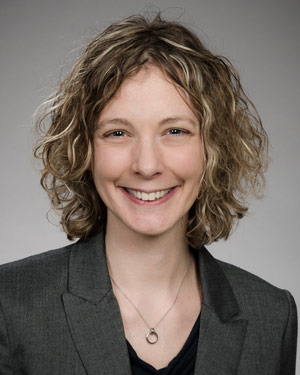
Co-Chair
Kelly Stevens, Ph.D.
James Chao-Yao Koh and Maria Lee Koh Endowed Engineering and Medicine Career Development Professor
Associate Professor, Bioengineering
University of Washington
Committee for the UnderRepresented and Marginalized (CURM)
Mission: As in other science and engineering fields, marginalized groups represent a small fraction of the medical and biological engineering (MBE) community. In 2009 AIMBE created CURM to recognize the contributions of underrepresented and marginalized groups (URM) in MBE and to advocate on their behalf for their advancement within the field. CURM seeks to educate people on issues affecting URMs and provide leadership training and greater opportunities to minorities in MBE and to current fellows in AIMBE.
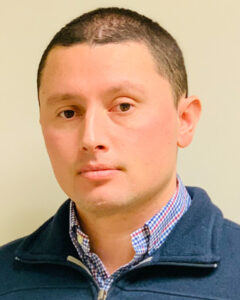
Co-Chair
Daniel Gallego-Perez, Ph.D.
Professor, Biomedical Engineering & General Surgery
Edgar C. Hendrickson Chair in Biomedical Engineering
The Ohio State University
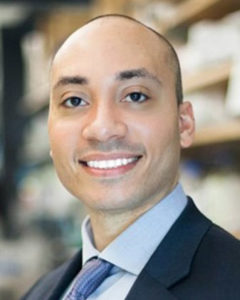
Co-Chair
Evan Scott, Ph.D.
Thomas A. Saunders III Family Jefferson Scholars Foundation Distinguished University Professor
Biomedical Engineering
University of Virginia
 AIMBE
AIMBE